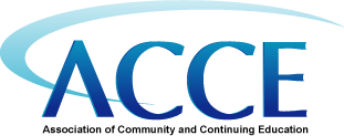It has been a little over two months since the 2016 ACCE Conference, and I would like to once again thank all of the attendees, ACCE Board members, presenters, and sponsors who contributed to such a memorable event. Judging from the evaluations, the content of the presentations addressed the needs and expectations of attendees. Monterey, with its historical and cultural settings embedded in the pristine nature, was a spectacular location for the event. As you might remember, I emailed a survey asking all ACCE members to point us in the right direction for next year’s conference location. The Board is discussing the possibilities and will make an announcement shortly.
At the conference, recognitions for Excellence in Program were awarded to Michelle King from Santa Monica College, Community Education Program and Julia Peterson from College of the Redwoods, Noncredit/Continuing Education. This year, the Lifetime Achievement Award went to ACCE Past President, Erica LeBlanc from Santa Monica College.
As we find ourselves in the middle of the spring semester, the ACCE Board finds itself busy participating in a number of state-wide activities. Valentina Purtell, ACCE Past President, has been attending Institutional Effectiveness Partnership Initiative (IEPI) meetings. Thanks to her participation, the recognition and validation of noncredit progress indicators is closer to becoming a reality. The Initiative has expanded its inclusion of noncredit participants at its meetings from one to three persons, which means ACCE will send two more of its Board members to those meetings. We feel our voices are being heard and our contributions to the state-wide dialogue about noncredit progress indicators are necessary and needed. Also present at the IEPI meetings, Academic Senate for California Community Colleges and specifically John Stanskas, Academic Senate Secretary, has been credited with truly supporting the noncredit cause. I sent a personal email to John on behalf of ACCE expressing our gratitude for his efforts.
Over the years, ACCE has been working to ensure that ongoing communication with Academic Senate becomes a reality. In the context of AEBG legislation, such collaborative efforts are crucial to inform faculty and administrators about the benefits of noncredit instruction. In the middle of April, the State Academic Senate Noncredit Committee held its Northern and Southern California Regional Meetings and ACCE Board members were present at each meeting.
As an advocacy group, ACCE strives to be on the cutting edge of legislation affecting noncredit and community education in California. Most recently, Madelyn Arballo from Mt. San Antonio College testified in Sacramento about the progress of the implementation of the AEBG plans. Also present at the hearing were representatives from adult schools in the state.
Spring is the time when the ACCE Board holds its elections and if you feel you can contribute to the field of community or continuing education at the state level, please don’t hesitate to contact ACCE. We can always use help.
Wishing you the best of spring semesters,
Jarek Janio
ACCE President
At the conference, recognitions for Excellence in Program were awarded to Michelle King from Santa Monica College, Community Education Program and Julia Peterson from College of the Redwoods, Noncredit/Continuing Education. This year, the Lifetime Achievement Award went to ACCE Past President, Erica LeBlanc from Santa Monica College.
As we find ourselves in the middle of the spring semester, the ACCE Board finds itself busy participating in a number of state-wide activities. Valentina Purtell, ACCE Past President, has been attending Institutional Effectiveness Partnership Initiative (IEPI) meetings. Thanks to her participation, the recognition and validation of noncredit progress indicators is closer to becoming a reality. The Initiative has expanded its inclusion of noncredit participants at its meetings from one to three persons, which means ACCE will send two more of its Board members to those meetings. We feel our voices are being heard and our contributions to the state-wide dialogue about noncredit progress indicators are necessary and needed. Also present at the IEPI meetings, Academic Senate for California Community Colleges and specifically John Stanskas, Academic Senate Secretary, has been credited with truly supporting the noncredit cause. I sent a personal email to John on behalf of ACCE expressing our gratitude for his efforts.
Over the years, ACCE has been working to ensure that ongoing communication with Academic Senate becomes a reality. In the context of AEBG legislation, such collaborative efforts are crucial to inform faculty and administrators about the benefits of noncredit instruction. In the middle of April, the State Academic Senate Noncredit Committee held its Northern and Southern California Regional Meetings and ACCE Board members were present at each meeting.
As an advocacy group, ACCE strives to be on the cutting edge of legislation affecting noncredit and community education in California. Most recently, Madelyn Arballo from Mt. San Antonio College testified in Sacramento about the progress of the implementation of the AEBG plans. Also present at the hearing were representatives from adult schools in the state.
Spring is the time when the ACCE Board holds its elections and if you feel you can contribute to the field of community or continuing education at the state level, please don’t hesitate to contact ACCE. We can always use help.
Wishing you the best of spring semesters,
Jarek Janio
ACCE President

 RSS Feed
RSS Feed
